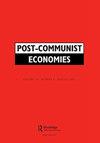信贷可得性与企业风险承担:来自中国绿色信贷政策的证据
IF 2.2
3区 经济学
Q2 ECONOMICS
引用次数: 20
摘要
本研究利用2008年至2019年中国a股上市公司的数据,首次将2012年政府实施的《绿色信贷指引》作为准自然实验,构建了差异中差异(DID)模型,实证检验了信贷可获得性对企业风险承担的影响。我们的研究发现,对重污染企业的信贷限制减少了它们的风险承担行为,并且对小企业、非国有企业、没有机构投资者的企业或位于低市场化地区的企业的影响更为明显。此外,我们的研究表明,信贷限制增加了融资约束,降低了投资水平,从而导致企业风险承担程度降低。此外,我们的研究表明,信贷限制增加了能源密集型和高污染行业企业的债务成本,降低了投资价值和发展能力。一个重要的启示是,为了有效遏制重污染行业的扩张和促进环境转型,绿色信贷政策应该针对小企业、国家和机构所有权较少的企业以及位于制度改革较差地区的企业。本文章由计算机程序翻译,如有差异,请以英文原文为准。
Credit availability and corporate risk-taking: evidence from China’s green credit policy
ABSTRACT Using data for firms publicly listed in China A-share markets during 2008 and 2019, this study is one of the first to treat Green Credit Guidelines implemented by the government in 2012 as a quasi-natural experiment and construct a difference-in-differences (DID) model to empirically examine the impact of credit availability on corporate risk-taking. Our study finds that credit restrictions on heavily polluting firms reduce their risk-taking behaviour, and the impact is more pronounced on small firms, non-state-owned enterprises, firms without institutional investors or firms located in low marketisation regions. In addition, our study demonstrates that credit restrictions increase financing constraints and reduce investment levels, which leads to less corporate risk-taking. Furthermore, our research shows that credit restrictions increase the cost of debt and reduce investment value and development capacity for firms in energy intensive and high pollution industries. An important implication is that to effectively curb the expansion of heavily polluting industries and promote environmental transformation, green credit policies should target small firms, firms with less state and institutional ownership as well as firms located in regions with poorer institutional reform.
求助全文
通过发布文献求助,成功后即可免费获取论文全文。
去求助
来源期刊

Post-Communist Economies
ECONOMICS-
CiteScore
4.90
自引率
18.20%
发文量
21
期刊介绍:
Post-Communist Economies publishes key research and policy articles in the analysis of post-communist economies. The basic transformation in the past two decades through stabilisation, liberalisation and privatisation has been completed in virtually all of the former communist countries, but despite the dramatic changes that have taken place, the post-communist economies still form a clearly identifiable group, distinguished by the impact of the years of communist rule. Post-communist economies still present distinctive problems that make them a particular focus of research.
 求助内容:
求助内容: 应助结果提醒方式:
应助结果提醒方式:


